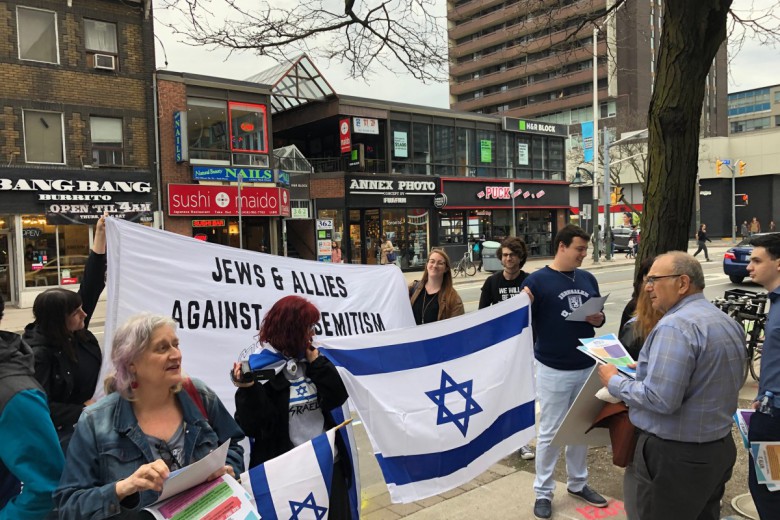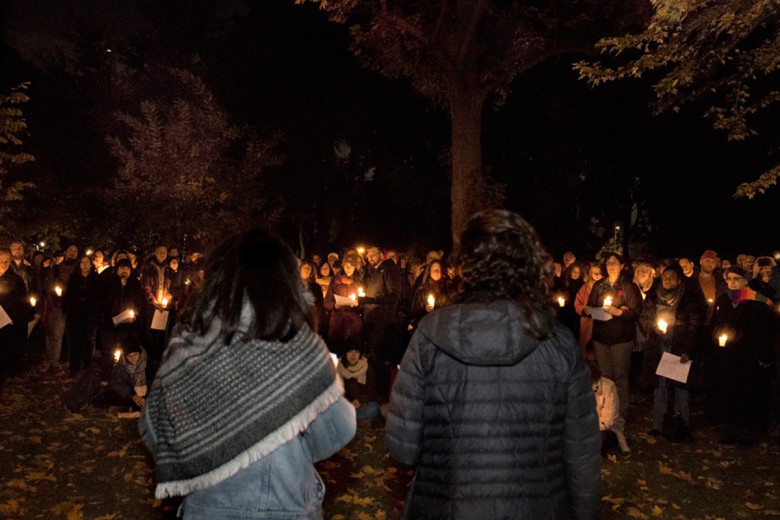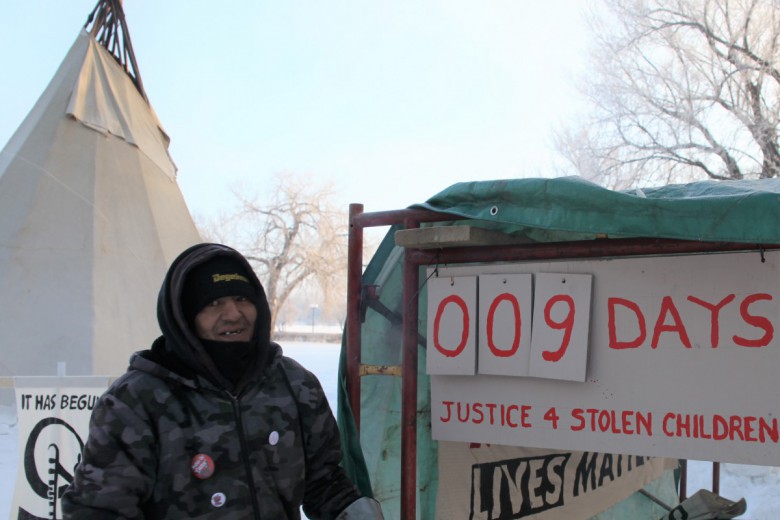Over the span of two evenings in mid-February, Palestinian, Jewish, and allied community members fighting for equity and fairness within the Toronto school system came out in full force to a Toronto District School Board (TDSB) planning and priorities committee meeting. Their goal? To respond to a concerning agenda item: a flawed and misleading community consultation report on how to address antisemitism in schools, which included a number of recommendations conflating antisemitism with anti-Zionism, criticism of the state of Israel, and support for Palestinian human rights.
I was one of 44 community members who spoke out against the report during the meeting, and hundreds who wrote and called TDSB trustees and senior staff in advance and in the days after.
As a granddaughter of Holocaust survivors on both sides of my family, I will never be OK with concerns for Jewish community safety being used to justify the oppression of others. It was encouraging to be part of a groundswell of voices rising up to demand that anti-Palestinian racism, anti-Arab racism, and Islamophobia be addressed with the same urgency as antisemitism in Toronto schools.
Anti-Palestinian racism harms everyone
A core concern that community members raised about the report presented to the TDSB planning and priorities committee in mid-February was its characterization of criticisms of Zionism, the political ideology behind the creation and maintenance of a Jewish national state in Palestine, in the following way: “The use of Settler-Colonial narratives about the State of Israel and the Jewish people as colonisers leads to significant harm and contributes to the systemic erasure of Jewish history and identity.”
This assertion is entirely detached from reality and obscures the ways that Zionism is used to justify and perpetrate anti-Palestinian racism and settler-colonial violence.
Anti-Zionist Jews like myself are often erased or demonized by Zionist Jewish and non-Jewish individuals and organizations who claim to speak for the interests of the global Jewish community – as if there has not been debate, criticism and opposition to Zionism within Jewish thought for as long as this nationalist movement has existed.
As Mohammed El-Kurd writes in Perfect Victims and the Politics of Appeal, “If we are assessing a certain ideological project (say, capitalism, Zionism, so on), why not judge it based on how it materially manifests rather than on the perceived attributes of its subjects? Zionism is best defined by its material manifestations—Zionism is what Zionism does.”
Palestinians suffer from Zionism and anti-Palestinian racism through an ongoing genocide predicated on their dehumanization, subjugation, and dispossession from their land. These forms of systemic oppression, under the guise of protecting Jewish people, also impact Jewish and non-Jewish people speaking out against the state of Israel’s regime of Jewish supremacy and advocating for legal equality and universal human rights.
Anti-Zionist Jews like myself are often erased or demonized by Zionist Jewish and non-Jewish individuals and organizations who claim to speak for the interests of the global Jewish community – as if there has not been debate, criticism and opposition to Zionism within Jewish thought for as long as this nationalist movement has existed. Jewish people are also harmed by a false and misanthropic narrative propagated by Zionists: that we require a safe haven, from a purported eternal threat of antisemitism, through a nation-state that must displace and oppress Palestinians to create and maintain a Jewish demographic majority in Palestine. This dangerous falsehood links our identity as Jews to the justification for a fundamentally violent settler-colonial project.
The TDSB report that concerned community members were mobilizing against in February was framed as an update on the board’s consultation process for “affirming Jewish identities” and “addressing antisemitism” as part of its “combatting hate and racism strategy”; ironically, the report’s contents, methodology, and the way that TDSB trustees and senior staff handled community responses to the report, had the effect of creating conditions for Jewish identities to be invalidated, antisemitism to go unaddressed, and other forms of hate and racism to be expressed with no pushback – before, during, and after the meeting to vote on the report.
For instance, in advance of the meeting, a group of TDSB employees sent a letter to senior staff and trustees, identifying themselves as Jewish educators who were concerned that the update that was being presented on the development of the board’s antisemitism strategy “does not accurately reflect the perspectives of Jewish staff, and worse, contains elements that are themselves antisemitic and harmful to both Jewish and non-Jewish TDSB students and staff.” This letter was sent to TDSB email addresses and was not publicized. The day before the board met to discuss the report, screenshots of the letter appeared in an Instagram post from an account with a large following that named the signatories and accused them of “masquerading as Jewish educators” to “erase Jewish identity from education.”
During the meeting, one community member who identified himself as Jewish told the board that Jewish community members who were raising concerns with the antisemitism strategy report on the agenda shouldn’t be listened to because we “do not participate in synagogue services.” I called out this remark as a disturbing attack on Jewish community members during my own delegation later in the meeting, but it was not addressed by any TDSB trustees or staff in attendance, nor were any of the other instances of antisemitism, hate or racism that occurred during the meeting.
Rabbi David Mivasair, who called into the meeting to share concerns with the development of the TDSB antisemitism strategy from his perspective as a Jewish faith leader, told me he was targeted with harassment during his delegation: “As soon as I began speaking to the Board by phone, I started being interrupted by incoming calls from a person I don’t know at all. These were followed by text messages full of profanity directing threats at me and my family. It was very distracting in the moment and deeply disturbing that someone would interfere in a public meeting in such a manner.”
Several other Jewish community members who spoke at the meeting received harassing emails. Following her delegation, one parent of a student in the TDSB, Zoë Wool, received an email at her work address comparing her and other Jews who raised concerns about the update on the antisemitism strategy to Jews who supported Hitler. “The comparison is absurd and difficult to take seriously,” she says. “But it's clear that the sender felt entitled to harass us.”
In some cases, harmful, or at least unhelpfully vague remarks about community members who participated in the meeting came from TDSB trustees themselves. One trustee, Alexandra Lulka Rotman, claimed that many non-Jewish people came to the meeting to “speak over Jews” (despite the majority of delegations coming from Jewish community members, all of whom had three minutes to speak uninterrupted, as did non-Jewish community members who had just as valid concerns to raise about the ways that equating antisemitism with criticism of Zionism and the state of Israel would impact them).
Lulka Rotman claimed she heard antisemitic tropes such as "blood libel, global Jewish power, and Holocaust inversion" – none of this occurred during the meeting – and also characterized community members who urged trustees to vote against the flawed and concerning update on the board’s antisemitism strategy as “agitators” who organized a “coordinated ambush.”
A coalition forged through shared struggle
While Palestinians, Jews, and allies clearly face an uphill battle pushing back against the ways in which concerns over antisemitism are used as a shield for anti-Palestinian racism, our voices are stronger together and we are gaining ground thanks to our concerted efforts.
Two groups who have been laying the foundation for this critical solidarity work in Toronto are Toronto Palestinian Families and Toronto Jewish Families.
Iman Annab and Ben Losman are two of their founding members. Their coalition work together is rooted in a deep and sustaining friendship that started over a decade ago.
When they first met, they were both still relatively new to Toronto, completing a masters in social justice education at the Ontario Institute for Studies in Education.
“It’s just exhausting,” says [Iman] Annab, “to be always told that you’re fringe, and you’re the minority, and you’re not really important, because there’s other voices that are more important. And having to constantly be on the defensive.”
Annab, who is Palestinian, had moved to Toronto with her two kids in 2013. Losman, who is Jewish and grew up in the suburbs in the U.S., had moved to Toronto in 2012 and had his first child a few years later.
As parents raising children in Toronto, they realized they shared the same struggle against anti-Palestinian racism in the city’s school system.
“Whether it’s related to educational material, policy, even just school events, you know, days of significance, any of these things … we just felt that, not just as Palestinians, but even as allies of Palestinians, our voices were not being represented at all,” says Annab.
Annab says that this has always been a struggle for her and her family in the Toronto school system, but it’s been particularly difficult in the wake of October 7, 2023 and the state of Israel’s escalating genocide of Palestinians.
“A weaponized understanding of antisemitism doesn’t just harm Palestinians, it harms Jewish people and it harms everyone,” [Ben Losman] says. “Because a weaponized version of antisemitism deflects and derails a real power analysis in terms of how antisemitism is a core part of so many harmful conspiracy theories – it’s an engine of racism, and it’s an engine of pro-colonial oppression.”
“It’s just exhausting,” says Annab, “to be always told that you’re fringe, and you’re the minority, and you’re not really important, because there’s other voices that are more important. And having to constantly be on the defensive.”
Losman says the way that concerns about antisemitism have been weaponized in the school system to silence Palestinian perspectives and experiences has been a struggle for him and his family as well.
“A weaponized understanding of antisemitism doesn’t just harm Palestinians, it harms Jewish people and it harms everyone,” he says. “Because a weaponized version of antisemitism deflects and derails a real power analysis in terms of how antisemitism is a core part of so many harmful conspiracy theories – it’s an engine of racism, and it’s an engine of pro-colonial oppression.”
The TDSB has a very robust commitment to equity. All that Annab and Losman say they want is for the board to actually put its principles into practice and ensure they apply to everyone.
Progress to date
A wave of organizing around three key incidents back in 2021 created the initial impetus for concerned community members to begin working together through Toronto Palestinian Families and Toronto Jewish Families:
First, a TDSB investigation into the actions of Javier Dávila, a student equity program adviser accused of sharing antisemitic material with other educators through an opt-in mailing list he had been offering for over a decade. The investigation was supposedly launched due to a resource that describes the Israeli occupation of Palestinian lands as racist and genocidal, and also states that Palestinians have been resisting the violence against them, mainly through non-violent resistance but sometimes through force.
Second, the censuring of journalist and anti-racist activist Desmond Cole, after he raised the issue of Palestinian human rights during presentations on systemic racism he was asked to deliver to TDSB staff and educators.
Third, the TDSB secondment of a staff member from the Centre for Israel and Jewish Affairs to provide education on antisemitism for the school system.
“A lot of people in our community have been educated by this,” Annab says. “That what underpins both antisemitism and anti-Palestinian racism is white supremacy and colonialism – this harms all of us.
Losman recalls how a coalition started to take shape very organically at this time:
“On my side, it was progressive Jews coming together and writing letters, and then demanding meetings with the director and kind of getting punted down the line. And as this was happening, because so many of us were in community with our Palestinian friends, we were keeping them informed of what we were doing, and the Palestinian side was also doing the same thing, and so we would compare notes and say: ‘Oh, we’ve got our meeting scheduled for then, when’s yours?’”
Then everything kicked into high gear after the TDSB’s blatantly racist approach to communications in the wake of October 7, 2023: multiple statements were made by the TDSB condemning the Hamas attacks without mentioning anything about the unfolding genocide of Palestinians.
“It just lit a fire under us to come together and start doing something about it in a more intentional way, a more structured manner,” Annab says.
Losman says a major concern for their coalition is the “now sort of all-out war that pro-Israel lobby groups, that are very present within the TDSB and at the provincial level as well within the Ministry of Education, have waged on even getting anti-Palestinian racism recognized as a unique and distinct force of oppression.”
He says what these pro-Israel groups want from the TDSB is “a much more exclusionary, anti-intersectional and harmful understanding of what antisemitism is.”
But thanks to the collective organizing of Toronto Palestinian Families and Toronto Jewish Families, the TDSB voted in June 2024 to address anti-Palestinian racism as part of its Combatting Hate and Racism Strategy. As the two groups continue to work together to hold the TDSB accountable to this commitment, their collaboration is contributing to a stronger foundation for Toronto’s Palestine solidarity movement overall – by shedding light on the shared roots of the struggle between Palestinian and Jewish community members.
While the majority of trustees at the mid-February TDSB planning and priorities committee meeting ended up voting to “receive” the update on the board’s antisemitism strategy, without consensus on the report’s dangerous recommendations and flawed methodology, our dissenting voices were heard loud and clear: TDSB staff were put in a position where they had to acknowledge that the report’s findings were based on insufficient community consultation, and that the way they communicated this update on the development of an antisemitism strategy created confusion and distress.
“A lot of people in our community have been educated by this,” Annab says. “That what underpins both antisemitism and anti-Palestinian racism is white supremacy and colonialism – this harms all of us.”
Losman says he hopes their coalition achieves so much more than their specific goals within the TDSB. Broader than that, he wants to completely upend the narrative, and gather the power required, to make material changes toward ending the way Jewish people and Palestinian people are played against each other.
“Jewish trauma is cheapened and weaponized in the name of preserving a political status quo that certainly I’m not thriving in,” he says. “I would hope that we are one building block toward a world in which collective flourishing and reciprocal care become the norm.”






_780_520_90_s_c1.jpg)
